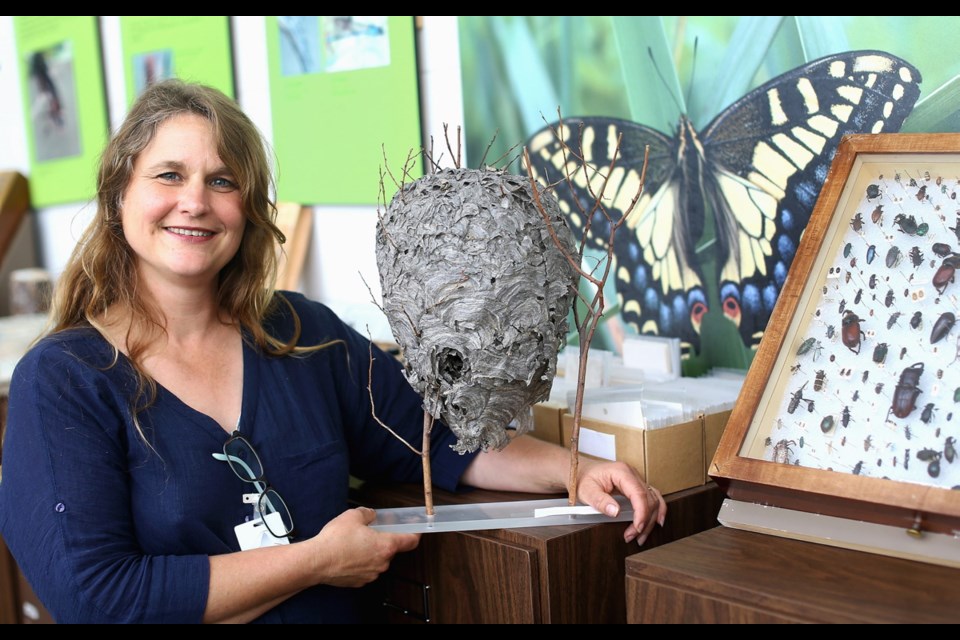Entomologist Claudia Copley likes wasps. Copley likes to watch them hunt for prey and she likes to think of all the ecological good they do keeping other insects in check.
“I like to think of myself as an advocate for the unloved,” Copley said in an interview at her office in the Royal B.C. Museum where she manages the insect collections.
She agrees wasps can spoil a picnic or a patio barbecue. And even dressed in a protective “bee suit” Copley said she would not want to work closely with wasps. They are just too defensive when disturbed.
According to Victoria pest-control firms, wasps are buzzing hugely this summer. Pest controllers are getting more calls for wasps than in the past six or seven years.
“It’s been crazy,” said James Sutherland, operations manager for Old Island Pest Control. “Probably every second call we get is wasp-related.”
“I don’t really know why,” said Sutherland. “It’s probably weather related.”
Copley said this year’s wasp population boom is likely due to a relatively warm winter and dry spring. Fewer over-wintering queens froze or were drowned out.
Wasp colonies typically spread their progeny by breeding many queens. These head out in fall to mate with males, also put out by colonies in the fall. The colonies and the males die but the mated females live on.
Females spend the winter in a warm enclosed space — a shed, a wood pile or attic. In the spring, they build a cone and create a new colony’s first generation of workers.
Copley said B.C. is home to about 20 species of wasps. But only a few of them are likely to be a bother at a picnic.
She said the wasps most noted by people in Greater Victoria are three species: the bald-faced hornet, the German yellowjacket and the European paper wasp.
Of the three, the introduced German yellowjacket is the one most likely to be bothersome at picnics.
It’s also the one likely to build its nest inside your attic, creating a structure that can reach about the size of a basketball in Victoria’s climate. Like all wasps, it constructs its nest by chewing up wood to create paper.
Also like all wasps, the German yellowjacket is a predator of other insects; caterpillars are a favourite.
The German yellowjacket is also a scavenger. Meat, whether it’s a dead raccoon or your barbecued steak, is always on the colony menu. Workers will collect morsels and fly them back as feed for growing larva.
The bald-faced hornet is bigger, stronger and very defensive of its colony. But unlike the German yellowjacket it won’t bother a picnic. It’s strictly a predator, usually other insects, although Copley said she once saw one sting a young toad to death and carry it off.
Also unlike the German yellowjacket or European paper wasp, the colours of the bald-faced hornet are black and pale grey, not black and yellow.
The bald-faced hornet often builds its colony nest in trees, where it can be seen — a grey structure about the size and often the shape of a football.
The European paper wasp is another introduced species and like the German yellowjacket it is yellow and black.
But unlike the German yellowjacket it will not bother a human picnic. Like the bald-faced hornet they are predators and don’t scavenge.
The European paper wasp is notable because it builds visible, little, comb structures. They can be spotted out in the open, with no paper sheet covering, hanging from a ceiling.
Copley said she appreciates why people dislike wasps at outdoor meals. Nobody likes to get stung and allergic reactions pose a medical threat.
But if space and location permit, she likes to think people can get along with creatures like the bald-faced hornet and the European paper wasp.
The wasps can escape a pesticide death. And people can enjoy a lusher garden picked a little cleaner of insect pests.
Besides, advocating for the unloved, like wasps, just goes with “entomology in general,” said Copley
“People forget that even butterflies are insects,” she said.



